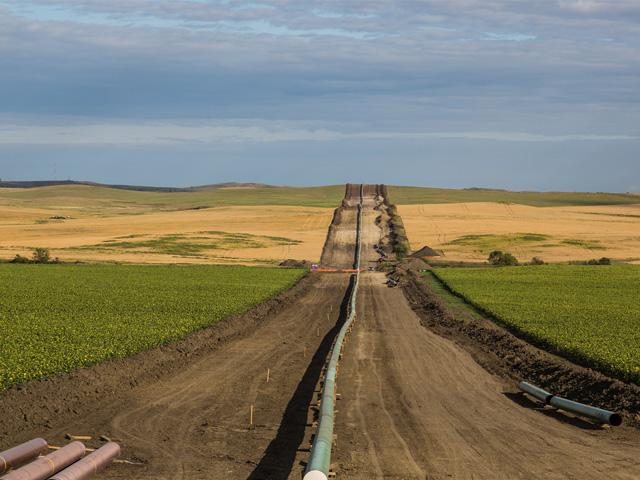Dakota Access Appeals to Supreme Court
Dakota Access Pipeline Owner Tells SCOTUS Court Can't Order Environmental Review
LINCOLN, Neb. (DTN) -- Dakota Access LLC argues the federal court that ordered an environmental review on the pipeline didn't have the authority to do so, in a petition filed with the Supreme Court on Monday.
The U.S. Court of Appeals for the District of Columbia Circuit revoked a permit for the Dakota Access pipeline and ordered an environmental review that is ongoing.
In a petition filed with the Supreme Court, Dakota Access LLC said Congress gave the authority to federal agencies to order environmental reviews.
Agriculture groups have told federal courts a permanent shutdown of the pipeline would have devastating consequences for farmers, who would face increasing grain transport congestion as a result of more oil being transported by rail.
"Thirty years ago, this court rejected several circuits' efforts to seize control of that decision," the company said in the petition.
"Rather than requiring agencies to 'convince' the court 'that the impact was insignificant,' as the D.C. Circuit required at the time, this court directed courts to defer to agency expertise 'even if ... a court might find contrary views more persuasive.'"
Dakota Access said the National Environmental Policy Act requires federal agencies to evaluate the environmental effects of "major federal actions" that will "significantly impact the environment."
If it's determined the effect will be significant, an agency is required to complete a detailed environmental impact statement, or EIS.
P[L1] D[0x0] M[300x250] OOP[F] ADUNIT[] T[]
Dakota Access said the D.C. Circuit has "charted a circuitous return to the 'convincing-case' standard" in determining whether an EIS should be completed.
"The panel held that NEPA requires an EIS whenever environmental impacts are 'highly controversial,' and that this, in turn, requires the agency to 'convince the court' that it has 'resolved serious objections to its analysis.' Both premises conflict with decisions from multiple circuits."
The company said the court ordered the review although the pipeline has "safely transported" 1 billion barrels of crude oil cross country without "a single spill" on its mainline.
"Compounding the problem, the panel held that this purported error warranted vacating the easement," Dakota Access said in the petition.
"The removal of the easement potentially leaves the pipeline vulnerable to a shutdown. The panel refused to consider the likelihood that the Corps would reinstate the easement on remand; the multi-billion-dollar, thousands-of-jobs economic impact to North Dakota and neighboring states resulting from a crippling of North Dakota oil production; or the environmental impact of replacing even a fraction of DAPL's carrying capacity with rail transport."
The Corps of Engineers is providing monthly updates on the progress of its review, while pipeline operations remain open.
The court in May ruled the Dakota Access pipeline could remain open pending the ongoing review.
In January the D.C. Circuit ruled Dakota Access violated the law by conducting work on the pipeline without an easement.
The Dakota Access pipeline was constructed underneath Lake Oahe, which was created when the Corps flooded thousands of acres of Sioux lands in the Dakotas by constructing the Oahe Dam on the Missouri River.
The lake provides several successor tribes of the Great Sioux Nation with water for drinking, industry and sacred cultural practices. According to the Mineral Leasing Act, the pipeline could not traverse the federally owned land at the Oahe crossing site without an easement from the Corps.
In December 2020, 14 states alleged in a brief the closing of the pipeline could hurt agricultural economies in the Midwest because of expected cost increases to ship grain.
In an amicus brief filed with the court, the states of Indiana, Montana, Iowa, Kansas, Kentucky, Louisiana, Missouri, Nebraska, Ohio, South Carolina, South Dakota, Utah, West Virginia and Wyoming sided with agriculture interests, the pipeline company and the Corps of Engineers.
From April 2016 to February 2017, Native American and other groups protested the construction of the pipeline running from the Bakken oil fields in western North Dakota and crossing the Missouri and Mississippi Rivers to southern Illinois.
Part of the pipeline runs near the Standing Rock Indian Reservation. Protests centered on concerns about the pipeline's effect on water supplies used for irrigation, drinking water and threats to ancient burial grounds.
The appeals court ruled the Corps violated environmental law in 2017 when it allowed the pipeline owner, Energy Transfer, to build beneath South Dakota's Lake Oahe.
Todd Neeley can be reached at todd.neeley@dtn.com
Follow him on Twitter @DTNeeley
(c) Copyright 2021 DTN, LLC. All rights reserved.




